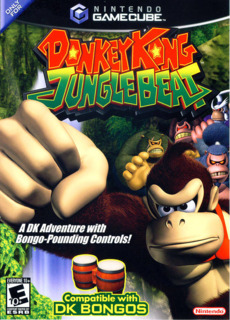Its surprisingly functional and refreshing gameplay mechanics are not enough to make up for the game's overall shortness
It is only natural that such a daring, and nearly stubborn, philosophy has given birth to a good number of sub par games or systems that just didn't fulfill their ambitious concept, but Donkey Kong: Jungle Beat – a platformer that could only have been produced by Nintendo – is successful even if its premise seems to be way too unorthodox to possibly work. The game lacks a plot, if it does have one it is way too hidden for one to notice, and from the get go the title makes it clear that it is not trying to be a grand adventure, instead its goal is to bring players a new take on the side-scrolling genre. If one wants to enjoy Jungle Beat they need to face it through the eyes of an old-school gamer: looking for the fun factor and giving little importance to a game's cinematic value.
Donkey Kong can only be controlled by using the Bongos and the commands are so simple you will be wondering how you could have possibly doubted that a side-scrolling game could be controlled by a set of two drums. Tapping the right drum will make the character move to the right, and the left one will have the opposite effect, tapping them fast will make Donkey Kong run and a soft beat will move him slowly. Beating both drums simultaneously causes the Kong to jump and clapping your hands serves as some sort of context sensitive command as it can stun enemies, grab nearby bananas or interact with close objects.
The controls work very well and are surprisingly responsive for the most part, still there are two situations in which the controls are bound to frustrate players. Underwater levels are annoying to navigate because the character does not swim down on a straight line, only diagonally, which makes some obstacles extremely hard to overcome. Mid-air control is also a little bit lacking because making Donkey Kong move a little further to right or left during a jump is a chore. Despite those tiny flaws, though, the gameplay remains unharmed during most of the time as those two issues don't appear very often.
The game is divided into sixteen different kingdoms each featuring two levels and ending with extremely creative boss fights. Those sixteen boss battles are not fully unique as some bosses appear more than once in different versions with higher health and stronger attacks, but they are very exciting and the variety they offer is delightful. Sixteen kingdoms may sound like a lot, but it isn't because it only takes an average of seven minutes to complete a kingdom, and if you do the math you will notice that finishing the game doesn't even amount to three hours, but fortunately Jungle Beat's main attraction isn't reaching its end, but getting great scores on all of the kingdoms.
Your major goal on each stage is to collect as many beats as possible. Beats are acquired by performing a number of actions such as getting bananas, beating down enemies and pulling off nice moves. There is a twist, though, since the game features an amazing combo system that multiplies the beats you have acquired if you manage to do lots of beat-earning actions without touching the ground, using wall jumps, other scenario elements, and even dead enemies as catapults or platforms to keep you in the air for a longer period of time. The stages are cleverly built in a way that one could probably go through them without ever hitting the floor, which leaves a lot of room for improvement and gives perfectionists many reasons to keep coming back.
The game gladly awards those who get many beats with medals. A bronze medal is given to anyone who beats a level, but silver, golden and platinum medals are only awarded to gamers who achieve a certain score, with the latter requiring nearly perfect stage runs to be acquired. Self-glorification aside, the medals are also important to unlock hidden kingdoms that usually hold a great degree of challenge to those looking to be absolutely flawless. Beats are also used as your health unit, which means that you will probably never see the Game Over screen if you are slightly good at playing games and you will also have to be extra careful for getting hit by enemies means your beat total will decrease a little bit, which may be enough to rob you off of a medal.
Jungle Beat's visuals are not the most beautiful ones you have seen on the Gamecube, but they certainly look quite good for a side-scrolling games featuring occasional effects that are fantastic. The character models are mostly seen from a certain distance, but when the game closes up a great level of detail is easily discernable. The soundtrack pales in comparison to the masterful tunes of the early Donkey Kong platformers, and while there are no stand out tracks the overall score is very pleasant and relaxing with the great sound effects standing out.
Overall Jungle Beat never ceases to be one of the most fun games around. Its totally extravagant concept may alienate a big audience that refuses to accept Nintendo's decision to do a far from traditional Donkey Kong platformer, but simply watching someone play or giving the game a chance is more than enough to tear down the walls of prejudice because Jungle Beat is extremely charming. The controls may be limited, but the imagination of Nintendo's developers knows no boundaries as Jungle Beat offers a very good amount of gameplay variety with moments that clearly throw back to the simian's early platformers such as a few animal buddies, and other sections that could only have been produced on Jungle Beat. When it is all said and done the game's very short length is its biggest weakness.
Actual Score: 7.9

